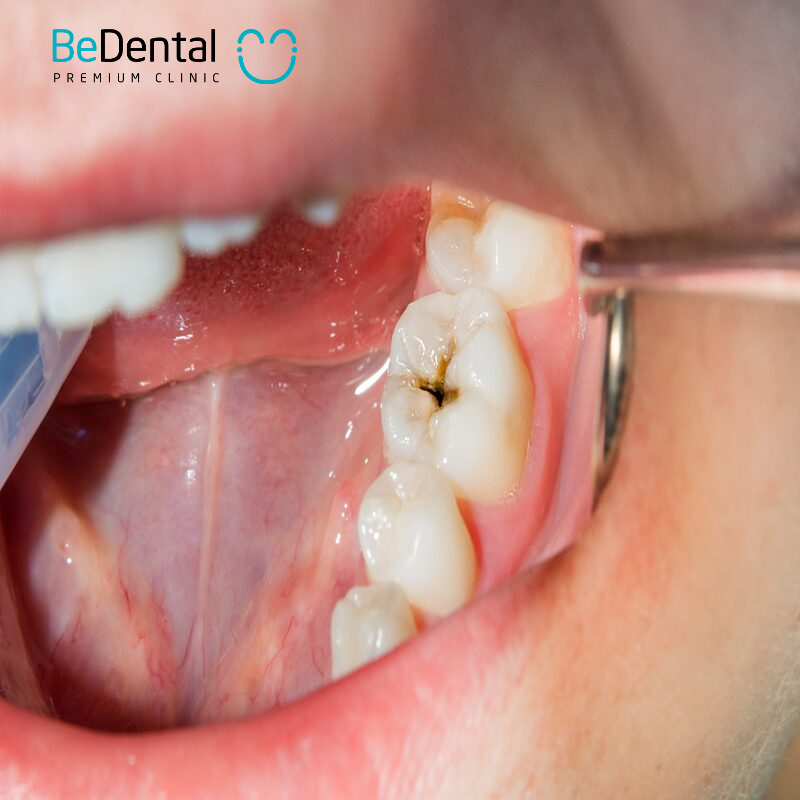In Vietnam, the prevalence of dental issues like cavities and gum disease remains high, with 90% of the population experiencing cavities at least once in their lifetime, according to statistics from the Ministry of Health. Globally, the World Health Organization (WHO) estimates that around 3.5 billion people face oral health problems, particularly cavities, periodontal disease, and tooth loss. How to prevent common oral health issues, daily oral care practices such as proper brushing, flossing, maintaining a healthy diet, and regular dental check-ups are crucial. These simple yet effective measures not only help maintain oral health but also protect overall well-being.
Statistics on Common Oral Health Conditions
Oral health has become a concerning global issue, affecting millions worldwide. Statistics show that approximately 3.5 billion people globally suffer from oral health problems, including cavities, gingivitis, and periodontal disease.
Cavities: In Vietnam, around 80% of children aged 6 to 12 have cavities, while 65% of adults aged 18 to 65 also face this problem. Worldwide, the WHO reports that approximately 60-90% of children and 100% of adults have experienced cavities at some point.

Gingivitis: In Vietnam, about 40% of adults experience gingivitis, with around 10% of the population suffering from severe periodontal disease. Globally, WHO states that roughly 50% of adults over 35 have gingivitis, while 15% have severe periodontal disease.
Oral Hygiene (From Journal of dental hygiene): In Vietnam, around 30% of the population does not brush their teeth regularly, and 70% do not use dental floss. Globally, only about 30% of people practice proper tooth brushing (twice a day).
Regular Dental Check-Ups: In Vietnam, only about 20% of the population visits the dentist regularly. Worldwide, around 30% of adults have not seen a dentist in the past two years.
Tooth Loss: Global statistics indicate that approximately 30% of adults aged 65 and older have lost at least one tooth. In Vietnam, the situation is similarly grim, with nearly 80% of children aged 6 to 12 experiencing cavities, and 65% of adults facing the same issue. The lack of awareness about oral health care, coupled with unhealthy lifestyle habits, is contributing to the rising prevalence of dental diseases. The connection between oral health and overall health is increasingly emphasized, as studies show a close relationship between oral conditions and serious diseases like cardiovascular issues and diabetes. Therefore, raising awareness and implementing preventive measures are essential to improving oral health in the community.
Common Dental Problems
Here are the causes and consequences of common dental issues.
Cavities: Cavities are among the most common oral health problems, primarily caused by the buildup of plaque and bacteria on tooth surfaces. When sugary foods are consumed, bacteria in the mouth convert sugar into acid, leading to the demineralization and destruction of tooth enamel. Factors like poor diet, inadequate oral hygiene, and lack of fluoride also increase the risk of cavities. If not treated promptly, cavities can lead to more severe issues, such as pulpitis, infections, and even tooth loss. Additionally, cavities can affect a person’s ability to eat and speak, leading to anxiety and a diminished quality of life.

Gingivitis: Gingivitis, or gum inflammation, typically results from improper oral hygiene, leading to plaque buildup on teeth. Symptoms include swollen, red gums, bleeding while brushing, and bad breath. If untreated, gingivitis can progress to periodontal disease, damaging the supporting tissues of the teeth and resulting in tooth loss. Gingivitis has also been linked to several other health issues, including cardiovascular diseases and diabetes.
Periodontal Disease: Periodontal disease occurs when gingivitis is left untreated, resulting in damage to the supporting tissues and bones around the teeth. The main causes include bacteria, infections, and risk factors like smoking, diabetes, and genetics. Periodontal disease can lead to tooth loss, severely affecting a person’s ability to eat and speak. Moreover, it can increase the risk of systemic diseases such as heart disease and diabetes due to the spread of bacteria from the mouth into the bloodstream.
How to prevent common oral health issues
Essentially, how to prevent common oral health issues, the methods for caring for and preventing dental diseases are similar. However, due to the unique characteristics of each type of disease, we need to pay special attention to certain solutions.
Preventing Cavities: Cavities are one of the most common oral health issues caused by plaque and bacteria buildup. To prevent cavities, the most important step is to maintain a proper tooth brushing habit with fluoride toothpaste, as fluoride strengthens tooth enamel and helps prevent cavities. Additionally, daily flossing is essential to remove plaque and leftover food between teeth that a toothbrush cannot reach. Reducing the intake of sugary foods, such as sweets and soft drinks, will also help lower the risk of cavities. Finally, regular dental check-ups should be scheduled to detect and treat early signs of cavities.
Preventing Gingivitis: Gingivitis is an inflammatory condition of the gums due to plaque accumulation. To prevent gingivitis, it is vital to maintain a daily oral hygiene routine. This includes brushing teeth properly and using dental floss to remove plaque. A specific recommendation for preventing gingivitis is to use mouthwash containing antibacterial ingredients. Moreover, choosing a soft-bristled toothbrush and brushing gently will prevent gum irritation. Maintaining a healthy diet rich in fruits and vegetables while limiting sugary foods will also contribute to reducing the risk of gingivitis.

Preventing Periodontal Disease (from CDC): Periodontal disease is a serious condition that can lead to tooth loss if not treated promptly. To prevent periodontal disease, controlling gingivitis is crucial. This involves practicing proper oral hygiene, such as brushing twice a day and flossing daily to remove plaque. A key point in preventing periodontal disease is to quit smoking, as smoking increases the risk of developing periodontal disease and slows recovery. Regular dental check-ups are also necessary to detect any gum-related issues early and provide timely treatment. A healthy diet rich in vitamins and minerals, along with proper hydration, will help improve gum health and prevent periodontal disease.
Oral Care Measures
In addition, we need to pay attention to habits and protective measures for oral health.
Avoid Bad Habits:
Quit Smoking: Smoking not only harms overall health but also increases the risk of dental diseases like gingivitis and periodontal disease. Quitting smoking improves gum health, enhances recovery ability, and reduces the risk of tooth loss.
Avoid Nail Biting and Chewing Hard Objects: These habits can chip teeth, wear down enamel, and cause severe damage. Avoiding hard objects will protect teeth from mechanical injuries.
Use Dental Protection Products:
- Night Guards: Teeth grinding, especially at night, can wear down enamel and cause jaw problems. Using a night guard is an effective way to protect teeth from damage caused by grinding.
- Fluoride Products: Fluoride strengthens tooth enamel and helps prevent cavities. Using fluoride-containing products, such as toothpaste and mouthwash, is an effective way to prevent plaque formation and protect teeth from decay.
Conclusion
Proper oral care is essential in preventing common conditions like cavities, gingivitis, and periodontal disease. Daily habits such as brushing, flossing, maintaining a healthy diet, and regular dental visits are crucial in protecting oral health. In Vietnam and globally,
For those seeking further consultation regarding dental examination services, please visit BeDental’s locations in Hanoi or Ho Chi Minh City. BeDental is a reputable dental clinic in Vietnam. You can also reach us at our hotline: (+84) 934.61.9090 / (+84) 899.555.636 or through our Facebook page, BeDental, for prompt and accurate assistance.




